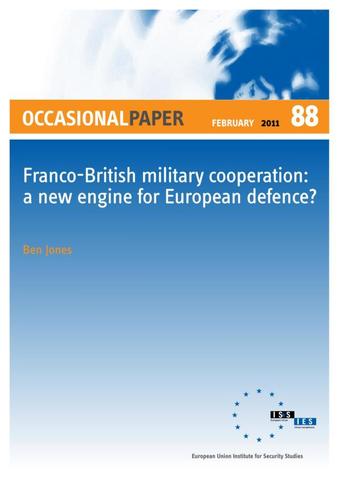You are here
Franco-British military cooperation: a new engine for European defence?

The St. Malo Agreement on European Defence Cooperation of 1998 set out a new approach to defence cooperation in pursuit of a new goal – an autonomous European military capability. By contrast, the Franco-British cooperation launched in November 2010 by Prime Minister Cameron and President Sarkozy is once again a new approach, but it is one that seeks to sustain the status quo – in support of sovereign foreign and defence policies. The primary motivation is not to produce a greater or more effective ‘European’ military capability. It is to maintain French and British aspirations to power projection and to military credibility in the eyes of the United States. The many similarities and shared vital interests of France and the UK underpin, but do not drive, the initiative. The end-goal is to retain access to military capability, whether that is through mutual dependence on each other’s industrial base and armed forces, or through pooling and sharing capability. The relationship between the new push for Franco-British military cooperation and wider European defence policy is therefore quite enigmatic. Franco-British cooperation does not entail a strategic reappraisal of European defence. It side-steps the strategic question of the role of NATO and the United States in European defence and security. It does not, for example, address concerns among some European states over the disengagement of the US from Europe. It could, potentially, cause divisions among European states if the Franco-British relationship is seen as too exclusive and not sufficiently concerned with wider European security. Yet for all that, Franco-British defence cooperation could provide a road-map to defence cooperation that is based on deeper capability planning and mutual dependency. The Defence and Security Cooperation Treaty signed by Cameron and Sarkozy is undoubtedly a step-change from the defence cooperation that has gone before. The UK and France will set a new ‘gold standard’ for defence cooperation. And without discovering how, and indeed whether, the initiatives that France and the UK embark on can work in practice, wider European defence cooperation has little hope of delivering anything. This paper attempts to explore in some detail the motivation for the November 2010 Treaty, how it might work in practice, and the impact it might have on wider European defence cooperation.